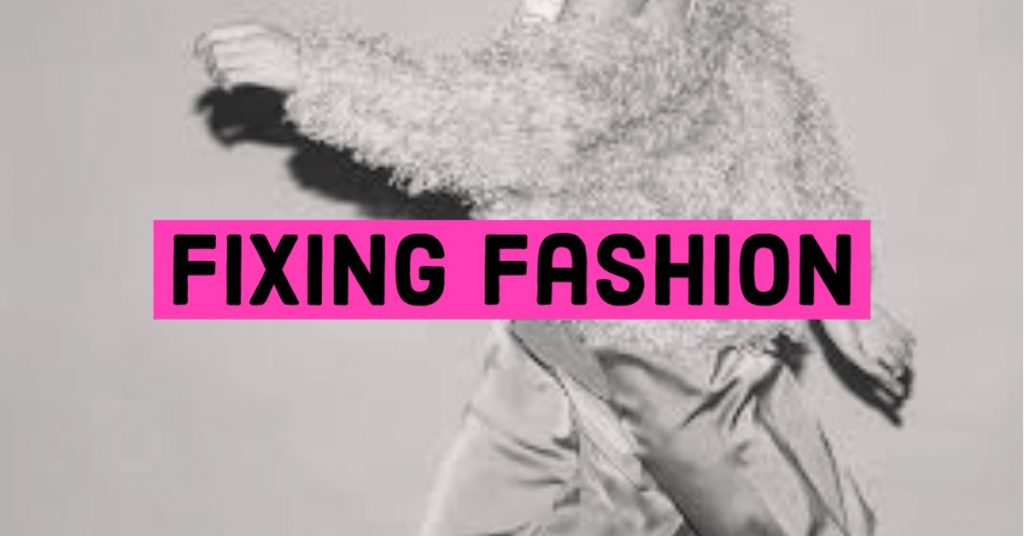
UK Parliament Report – Fixing Fashion: Clothing Consumption And Sustainability
The way we make, use and throw away our clothes is unsustainable. Textile production contributes more to climate change than international aviation and shipping combined, consumes lake-sized volumes of fresh water and creates chemical and plastic pollution. Synthetic fibres are being found in the deep sea, in Arctic sea ice, in fish and shellfish. That, at least, is what the UK Parliament has found in their last report titled Fixing Fashion: Clothing Consumption and Sustainability.
Fashion is big business in the UK. People buy more clothes per person in the UK than any other country in Europe. The fashion industry was worth £32 billion to the UK economy in 2017. This was an increase of 5.4% on 2016; a growth rate 1.6% higher than the rest of the economy. The industry employs 890,000 people in the UK in retail, manufacturing, brands and fashion design businesses. According to consultants McKinsey the global apparel, fashion and luxury industry outperformed all other market indexes in profitability between 2003 – 2013 ‘outstripping even high-growth sectors like technology and telecommunications.’ In recent years some UK high street retailers have struggled in the face of online competition, but UK manufacturing is seeing some growth and our fashion designers are going from ‘strength to strength’, according to the British Fashion Council
But everything starts with our current fashion industry, dominated by the ‘Fast fashion’ business model. This is a term used to describe a new accelerated fashion business model that has evolved since the 1980s. It involves increased numbers of new fashion collections every year, quick turnarounds and often lower prices. Reacting rapidly to offer new products to meet consumer demand is crucial to this business model. But it also comes at a high price.
The social cost of our clothes
Our biggest retailers have ‘chased the cheap needle around the planet’, commissioning production in countries with low pay, little trade union representation and weak environmental protection. In many countries, poverty pay and conditions are standard for garment workers, most of whom are women.
We are also concerned about the use of child labour, prison labour, forced labour and bonded labour in factories and the garment supply chain. Fast fashions’ overproduction and overconsumption of clothing is based on the globalisation of indifference towards these manual workers.
Forced labour is used to pick cotton in two of the world’s biggest cotton producing countries, Turkmenistan and Uzbekistan. Labour exploitation is also taking place in the UK. ‘Made in the UK’ should mean workers are paid at least the minimum wage. But we were told it is an open secret that some garment factories in places like Leicester are not paying the minimum wage.
This must stop. But if the risk of being caught is low, then the incentive to cut corners is high. The same fast fashion retailers sourcing from Leicester are also selling clothes so cheaply that they are being treated as single use items.
Textile waste and collection
In this chapter, the report goes into detail about textile waste and collection. We buy more clothes per person in the UK than any other country in Europe. A glut of second hand clothing swamping the market is depressing prices for used textiles. What can’t be sold is torn up and turned into insulation and mattress stuffing.
Worse still, around 300,000 tonnes of textile waste ends up in household black bins every year, sent to landfill or incinerators. Less than 1% of material used to produce clothing is recycled into new clothing at the end of its life.
Meanwhile, retailers are burning new unsold stock merely to preserve their brand.
Fashion shouldn’t cost the earth. But the fashion industry has marked its own homework for too long. Voluntary corporate social responsibility initiatives have failed significantly to improve pay and working conditions or reduce waste. The scientific warnings are stark on sustainability. Overconsumption and climate change are driving mass extinction.
New economic models for the fashion industry
We need a new economic model for fashion. Business as usual no longer works. The Government should change the law to require companies to perform due diligence checks across their supply chains.
UK designers are already taking a lead on sustainable fashion. We heard from a range of exciting, innovative and sustainable fashion businesses and designers in the UK who are forging a new vision for fashion.
These innovators are faced with competition from businesses who are focused on reducing costs and maximising profits regardless of the environmental or social costs. The government needs to provide clear economic incentives for retailers to do the right thing.
We recommend that the Government reforms taxation to reward fashion companies that design products with lower environmental impacts and penalise those that do not. Moving from conventional to organic cotton and from virgin polyester to recycled PET (in garments designed to minimise shedding) would help to reduce the negative impact of the clothing industry.
The Government should investigate whether its proposed tax on virgin plastics, which comes into force in 2022, should be applied to textile products that contain less than 50% recycled PET to stimulate the market for recycled fibres in the UK.
Conclusions and recommendations
We recognise that fast fashion has made it affordable for everyone to experience the pleasure of style, design and the latest trends. We were told however that the most sustainable garment is the one we already own and that repairing, rewearing, reusing, and renting are preferable to recycling or discarding clothes.
The Government must change the system to end the throwaway society. Often it is more expensive to repair an item than buy a new one. Many of us also lack the skills to perform more than basic clothing repairs.
The Government should make fashion retailers take responsibility for the waste they create and reward companies that take positive action to reduce waste. A charge of one penny per garment on producers could raise £35 million to invest in better clothing collection and sorting in the UK.
The Government’s recent pledge to review and consult on extended producer responsibility for the textile industry by 2025 is too slow.

fashionabc is a fashion technology platform, comprising a digital directory and various other digital tools and supply chain solutions for the fashion industry ecosystem, that focus on ethical fashion and sustainability. We are building inclusive digital transformation tools for fashion professionals who are willing to take steps towards a more sustainable ethical fashion industry, by adopting AI and DLT blockchain technology.
* building digital profile and IP solutions for fashion businesses
* tackle issues such as provenance and counterfeit in supply chain
* contribute to the construction of a meritocratic ethical fashion industry which is certified and part of the circular economy











